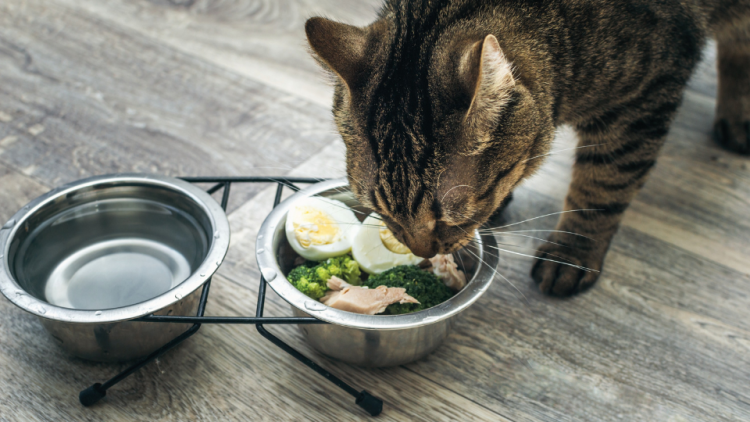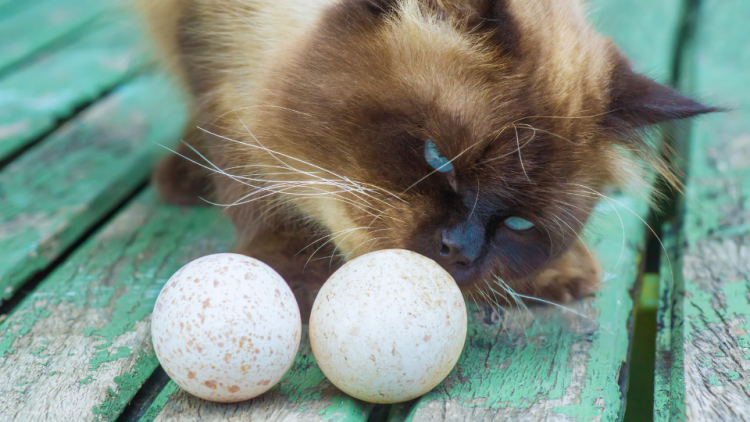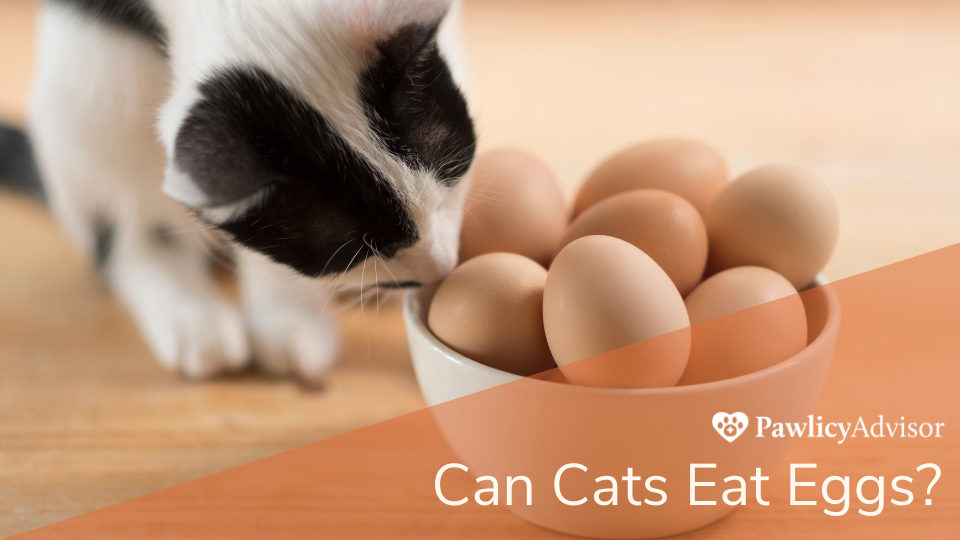You might already know that dogs can eat eggs, but what about our feline friends? Are eggs okay for cats?
The answer is yes, cats can eat eggs in moderate amounts, though it’s always best to talk to your vet before feeding your kitty new food. There are certain situations in which eggs are bad for cats, so you need to be careful.
Let’s take a closer look at the benefits and risks of feeding your cat eggs.
Table of Contents:
- Are eggs okay for cats?
- When are eggs bad for cats?
- How many eggs can cats eat?
- Can cats eat egg white?
- Is egg yolk good for cats?
- Can kittens eat eggs?
- Do cats need to eat eggs?
- Key Takeaways
Pro Tip: Cats are one of the most independent pets, which means that they can easily get injured or ill (for instance, after indulging in foods they are not supposed to eat). By enrolling in a pet insurance plan, you’ll make sure your pet’s wellbeing isn’t decided by your financial situation, but rather by what is best for them.
Are eggs good for cats?
Eggs are good for cats and can be safely consumed in moderation once cooked. Felines are obligate carnivores, which means they meet their nutritional needs by consuming animal proteins. Eggs are a perfect source of protein, which is why many cat food manufacturers add them into their formulas. Breeders also add eggs to cats’ diets to give them healthier claws and shinier coats.
Eggs offer much more than just protein. Here are more benefits of cats eating eggs:
- Vitamin A supports the health of your cat’s coat, skin, nervous system, and heart.
- Vitamin B12 supports your cat’s nervous system, immune system, and digestive system.
- Riboflavin, also known as vitamin B2, promotes the production of red cells and antibodies your kitty needs in order to keep disease at bay.
- Thiamine (Vitamin B1) supports healthy carbohydrate metabolism.
- Vitamin D supports bone growth. Cats don’t produce this vitamin on their own, nor can they synthesize it like we do, which is why it’s added to cat food.
- Vitamin E is an antioxidant that fights radical damage.
- Zinc is an essential mineral that improves the quality of your cat’s hair and skin and keeps their reproductive system in good health.
- Iron is responsible for keeping the red blood cells in good health. If your pet doesn’t get enough iron in their diet, they can become anemic.
- Taurine can only be found in animal proteins and is necessary for maintaining healthy eyes and heart. Cats can’t produce taurine themselves, so it is frequently added as a supplement to cat foods.
- Amino acids. Eggs are very rich in amino acids, the building blocks of protein. Felines need eleven essential amino acids and ten are found in eggs.
- Biotin helps cats process and excrete protein, supports the adrenal and thyroid glands, and improves the quality of their coat and skin.
- No carbs. As obligate carnivores, cats have no essential need for carbohydrates. Eggs are free from carbohydrates and a great source of pure protein.

When are eggs bad for cats?
Although they can provide our feline friends with many essential nutrients, in some situations, eggs can be bad for cats and may damage their health.
First, eggs are quite high in calories, fat, and cholesterol, which is why they should only be given in small amounts. Too many eggs can result in obesity and related health issues, so offer them as an occasional treat or a supplement that is part of a well-balanced diet.
Second, eggs are a common allergy among felines, and should therefore be introduced to their diet slowly. Try feeding just a taste at first to see if there’s an adverse reaction. If your cat shows signs of an allergic reaction (itching, ear infections, or stomach upset), stop feeding and call your veterinarian.
Eggs should not be given to cats suffering from certain health conditions like kidney disease and obesity, as well as to cats with pancreatitis. Remember to always talk to your vet before feeding your pet new food, especially human food.
How many eggs can cats eat?
Cats don’t need many calories (an average 10-pound cat needs only about 150 to 200 calories a day), and the amount of egg your cat consumes should make up no more than 10% of their daily calorie intake. A full egg is likely going to be too much for your cat and can make them sick. In fact, one whole egg for cats is equal to about eight eggs for humans. One egg contains 90 calories, so the quantity you give them should be very small.
Can cats eat egg white?
Egg whites contain protein without the fat, so they’re very good for cats to eat in moderation. According to PetMD, about one tablespoon of egg whites in addition to your cat’s normal diet is enough to supplement the amount of protein they consume.
Is egg yolk good for cats?
No. Yolks contain the bulk of an egg’s calories, fat, and cholesterol, so feeding your cat egg yolk can negatively impact a balanced, nutritional diet.
Can cats eat scrambled eggs?
Cats can eat cooked eggs in any form: scrambled, boiled, poached, or fried, as long as you don’t add any seasoning, salt, spice, sauce, or additives. Some of the ingredients that are commonly added to eggs (such as cheese, garlic, and onions) can be toxic to cats or cause gastrointestinal (GI) upset.
It should be noted that cooked eggs that contain yolks have an increased caloric and fat content, which increases the risk of obesity, pancreatitis, and GI issues in felines. Only offer cats cooked egg whites to reduce this risk.

Can cats eat raw eggs?
Cats can’t eat raw eggs without the risk of consuming dangerous bacteria such as E. coli and salmonella, which can cause serious GI issues in cats. Raw egg whites also contain avidin, a protein that inhibits the absorption of complex B vitamins and biotin. Heat significantly reduces the amount of avidin present per serving.
Cooked eggs are the only type of serving that’s safe for cats to eat. If your pet has consumed raw or undercooked eggs, you should contact your vet immediately.
Pro Tip: It’s not uncommon for cats to eat something they shouldn’t, or to experience an accidental injury. In these circumstances, getting to a vet quickly can be crucial for their survival, but emergency treatments can be very expensive. The value of pet insurance allows pet owners to focus on their loved one and the immediate care they need, without stressing over the cost of care.
Can cats eat eggshells?
Eggshells are a great source of calcium, a mineral that is important for bone strength in both felines and humans. However, they are less palatable and could be contaminated with salmonella, so it’s best to boil the shells first then crush them into small pieces (or use a coffee grinder to obtain a powder) before sprinkling them into your pet’s food.
Can kittens eat eggs?
Just like mature cats, kittens can eat eggs that have been cooked in small quantities. It should be noted that kittens need a complete and balanced diet to ensure they have all the nutrients they need to grow, so eggs shouldn’t be a kitten’s sole source of food. Talk to your vet before feeding a kitten eggs to confirm their approval.
Do cats need to eat eggs?
Cats are generally picky eaters and they tend to like consistency. If they don’t want to eat eggs, they don’t have to. As carnivores, cats require properly formulated food to meet their nutritional requirements. Eggs are a good choice only if they’re offered as part of a well-balanced diet. In general, treats are not balanced and shouldn’t make up a significant portion of your cat’s daily intake - specifically, no more than 10%
Key Takeaways
- Eggs are rich in protein and amino acids that are good for cats. Cats can eat eggs in moderation and as an occasional treat.
- Too many eggs can cause health issues. Felines with certain medical conditions shouldn’t ever eat eggs.
- You can feed your cat fully cooked eggs, but avoid raw consumption as they can result in food-borne illnesses.
- Be sure to consult your veterinarian before feeding your kitten or cat eggs.
